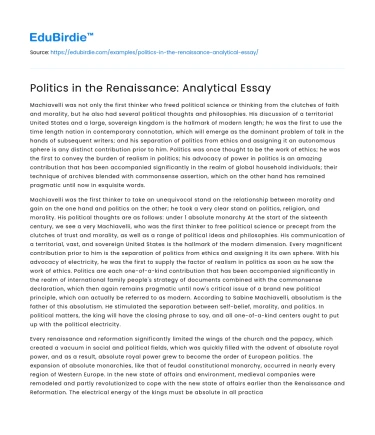Introduction
The Renaissance, a period from the 14th to the 17th century, marked a profound transformation in European culture, philosophy, and politics. Originating in Italy, this era saw a departure from the medieval worldview, embracing instead a revitalization of classical learning and a renewed interest in the arts and sciences. Central to this cultural rebirth was the emergence of new political ideas and structures that challenged the established order. The Renaissance period was characterized by the decline of feudalism, the rise of centralized states, and the increasing importance of secular governance. This essay seeks to explore the political landscape of the Renaissance, examining the shift from medieval to modern political thought, the role of influential figures, and the impact of humanism on political governance. By analyzing these themes, we can better understand how the political innovations of the Renaissance laid the groundwork for the modern state system.
Transition to Modern Political Thought
The political thought of the Renaissance was marked by a significant shift from the theocentric perspectives of the Middle Ages to a more human-centered approach. Central to this development was the rise of humanism, a movement that emphasized the potential and agency of humans, inspired by the rediscovery of classical texts. Renaissance thinkers like Niccolò Machiavelli and Thomas More were pivotal in this intellectual shift. Machiavelli's seminal work, "The Prince," advocated for realpolitik and pragmatic governance, challenging the idealistic and often moralistic approaches of medieval rulers. He famously stated that "it is better to be feared than loved," if one cannot be both, underscoring a pragmatic, sometimes ruthless approach to power that was revolutionary for its time (Machiavelli, 1532).
Save your time!
We can take care of your essay
- Proper editing and formatting
- Free revision, title page, and bibliography
- Flexible prices and money-back guarantee
Meanwhile, Thomas More's "Utopia" presented a vision of an ideal society that critiqued the political structures of contemporary Europe. More's work, although fictional, sparked discussions on governance, justice, and the role of the state, reflecting the era's growing discontent with existing political frameworks. These ideas were not without controversy; they faced opposition from traditionalists who viewed them as a threat to the established religious and political order. Despite resistance, the political thought of the Renaissance laid the foundations for modern political theory, influencing later philosophers like Hobbes and Locke.
Emergence of Centralized States
The Renaissance also witnessed the emergence of more centralized forms of governance, as monarchs sought to consolidate power and diminish the influence of feudal lords and the Church. This era saw the rise of nation-states, with strong central governments becoming the norm. In England, the Tudor dynasty exemplified this trend, as Henry VII and subsequent Tudor monarchs implemented policies to centralize authority, reduce the power of the nobility, and establish a more unified national identity. Similarly, in France, the Valois and Bourbon dynasties worked to strengthen royal authority, laying the groundwork for the absolute monarchy that would reach its zenith in the reign of Louis XIV.
These political changes were driven by both internal and external factors. Internally, the need for efficient tax collection and administration pushed rulers toward centralization. Externally, the constant threat of warfare, exemplified by the Italian Wars and conflicts with the Ottoman Empire, necessitated stronger, more unified states capable of mobilizing resources and defending their territories. The consolidation of power also involved significant diplomatic maneuvering, as rulers formed alliances and expanded their influence through marriage and treaties. This period of political centralization, while enhancing the power of monarchs, also set the stage for future conflicts between centralized states and emerging democratic movements.
Impact of Humanism on Governance
Humanism, with its emphasis on individual potential and critical thinking, profoundly influenced Renaissance governance. This intellectual movement encouraged rulers and politicians to adopt more secular and rational approaches to government, moving away from the heavily religious and dogmatic policies of the Middle Ages. Humanist scholars such as Erasmus and Leonardo Bruni advocated for education reforms, arguing that a well-informed citizenry was essential for effective governance. Their works emphasized the importance of civic virtue and the role of the state in promoting the common good.
The impact of humanism on politics was evident in the policies of city-states like Florence and Venice, where governance was often characterized by a blend of oligarchy and republicanism. These states became centers of learning and culture, attracting scholars and artists who contributed to the intellectual vibrancy of the Renaissance. However, the influence of humanism was not universally embraced, and its emphasis on secularism was met with resistance from the Catholic Church, which sought to maintain its spiritual and temporal authority. Despite this resistance, the ideas of humanism gradually permeated European political thought, contributing to the development of more secular and democratic political systems in the centuries that followed.
Conclusion
In conclusion, the Renaissance was a period of significant political transformation that laid the foundation for modern political systems. The shift towards human-centered political thought, the emergence of centralized nation-states, and the influence of humanism on governance were pivotal developments that characterized this era. Although these changes were met with resistance from traditionalists and the Church, they ultimately contributed to the decline of feudalism and the rise of secular, centralized states. The political innovations of the Renaissance not only reshaped the governance structures of the time but also influenced the development of political theory and practice in the centuries that followed. By understanding the political dynamics of the Renaissance, we gain insight into the evolution of modern political systems and the enduring impact of this transformative period in history.






 Stuck on your essay?
Stuck on your essay?

